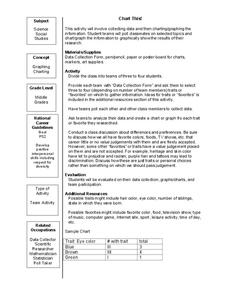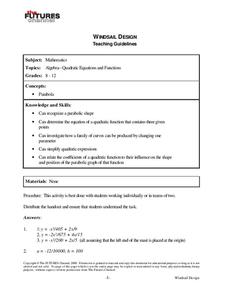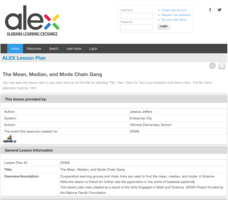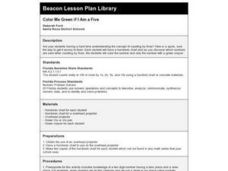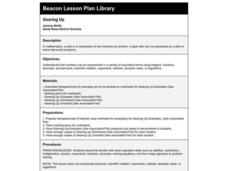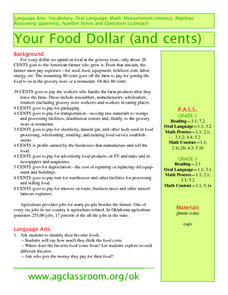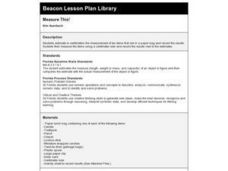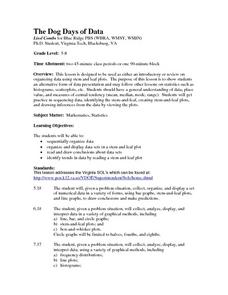Curated OER
Points in the X-Y Plane
Young scholars plot points on the x-y plane using x and y coordinates. They describe how the x and y values relate to the position of the point on the plane. Finally, students plot points that fit a linear relationship and summarize that...
Curated OER
Chart This!
Students collect data and graph or chart the information. In this data organization lesson, students poll their classmates about certain topics and chart or graph the information to show the results of their research.
Curated OER
Physics: Visualization of Hydrogen Wave Functions
Students explore various methods for visualizing the results of hydrogen wave function. They observe trends using a polar plot tool and make plots for the first three energy levels of the radial wave function for hydrogen. Students apply...
Curated OER
Windsail Design
Students fit quadratic models to windsail designs. For this fitting quadratic models to windsail designs lesson, students compare quadratic models of sails with different measurements and mast size. Students vary the a-value for a sail...
Alabama Learning Exchange
The Mean, Median, and Mode Chain Gang
Students analyze a set of data. They work in cooperative groups and use chain links to identify the mean, median, and mode of the chain.
Curated OER
It's Alive! Using Microorganisms in Cooking
Students create a KWL chart about food. In this chemistry lesson, students differentiate physical and chemical changes. They explain how microorganisms are used in food preparation.
Curated OER
Color Me Green If I Am a Five
First graders count by 5's to 100. They use a number chart to identify and mark all numbers ending in five or zero. They use the charts to participate in choral counting.
Curated OER
Multiple Intelligences
Students investigate Gardner's theory of multiple intelligences. For this research based lesson, students compare theories of intelligences and examine the implications of using these theories in schools and society.
San Francisco Public Utilities Commission
Water from the Well
How much water does it take to brush your teeth? How about to wash your clothes? Perform an experiment that measures water usage in everyday tasks and compares them to the days before indoor plumbing, specifically the California gold...
Alabama Learning Exchange
Partying with Two/Three Digit Whole Numbers
Learners practice problem-solving with this addition activity. They plan a party for their class and another class by determining how many cupcakes are needed. Students draw a picture of how they determined the number of cupcakes.
Curated OER
Figuring Out Equations With Figurines
Pupils inspect solving equations with one variable. Through the use of a scale balance, they examine the importance of equality in an equation. By playing a balance game with figurines and a scale, students discover methods of solving...
Curated OER
Currency and Exchange Rates
Fifth graders share the book, "The Story of Money" and discuss the uses of money, bartering, trade and the history of money. Students discuss various ways of spending: cash, check, debit/credit cards and review the check writing process....
Curated OER
Survival or Democracy?
Students take a closer look at Pakistan today. In this current events instructional activity, students visit selected websites to discover a history of the country, the cultural values of its citizens, and structure of the of the...
Curated OER
Chronic Conics
Fourth graders use two activities to draw four different conic sections. One activity is of a physical nature and one is traditional paper and pencil.
Curated OER
Your Food Dollar (and Cents)
Young scholars examine where their food dollars go while recognizing coins and making change. They identify their favorite foods, receive one dollar, and take away amounts for each person involved in the production of their food dollar.
Curated OER
Measure This!
Students estimate the measurement in centimeters for common classroom objects. They check their estimations, discuss the differences and write a paragraph summarizing the activity.
Texas Commission on the Arts
The Quarter Fold
Little ones identify the US quarter and explore the concept of one-fourth or one-quarter. Using real coins or coin manipulatives, they divide a square piece of paper into quarters, discuss halves and quarters, and create a design that...
Alabama Learning Exchange
Lining up the Decimals
Fifth graders order decimals from least to greatest and greatest to least. In this decimal order instructional activity, 5th graders complete an online review of comparing 2 digit numbers. Students then complete a decimal order card game...
Curated OER
Acid Attack
Learners explore the effect of chemical erosion on statues and monuments. They use chalk to see what happens when limestone is placed in liquids with different pH values. They also discover several things that engineers are doing to...
Curated OER
Introduction to Topographic Maps
Tenth graders create a topographic map and see how it represents different elevations. In this topographic maps instructional activity students read and interpret topographic maps.
Curated OER
Lattice Method of Multiplication Variances
Students explore the lattice method of mulitplication variances through the game "Multiplication Wrestling." They view a model of how to play the game and play three rounds, recording their patterns and discussing the strategies used to...
Curated OER
The Dog Days of Data
Students practice an alternative form of data presentation. They practice sequencing data, identifying the stem-and-leaf, creating stem-and-leaf plots, and drawing inferences from the data by viewing the plots.
Curated OER
All About Me
Learners answer short answer questions, state their likes and dislikes, say what roles they have, and more about themselves. In this all about me lesson plan, students read books about how we are all different and the same.



